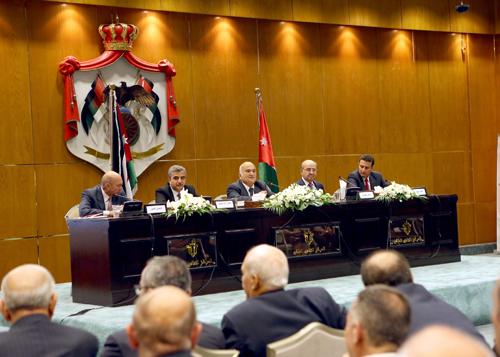You are here
Arab Thought Forum issues book compiling Royal discussion papers
By Dana Al Emam - Sep 10,2015 - Last updated at Sep 10,2015

HRH Prince Hassan chairs a meeting to announce a book in which the Arab Thought Forum compiled a series of discussions of His Majesty King Abdullah’s discussion papers (Photo courtesy of Arab Thought Forum)
AMMAN — The Arab Thought Forum (ATF) on Tuesday issued a publication compiling its dialogue sessions of the Royal discussion papers authored by His Majesty King Abdullah, under the patronage of HRH Prince Hassan, the forum's president.
The book, based on 17 sessions of intensive research and analysis of the papers' content, discusses building democracy, developing the democratic system, the role of parties involved in political action, democratic empowerment and effective citizenship, successful democratic transformation and deepening democratic transformation.
Speaking at the launching event, Prince Hassan said embracing dialogue that respects diversity of opinions and identifies national and regional commonalities is crucial for the progress and the future of the nation, citing the discussion papers as “stimulators of thinking and dialogue”.
He highlighted that the five discussion papers, which came in harmony with the political reform process in Jordan, as a road map that guides the country's decision makers to reform, adding that systematic reform has to be inclusive of the political, socio-economic and civil society aspects.
These three elements combined trigger free public will and societal enlightenment, he added, noting that all ATF dialogue sessions witnessed active discussions.
For his side, the forum's Secretary General Mohammad Abu Hammour said the book is an "intellectual reference" that resulted from a free and constructive dialogue on the discussion papers that aim for expanding the reform dialogue to the national level.
"The papers are based on three pillars; gradual deepening of parliamentary governments under constitutional monarchy, which is supported by public participation and active citizenship," he said.
Despite the surrounding regional changes, Jordan is able to create its own democratic model on a solid base and a renewable spirit, Abu Hammour said, adding that the Royal discussion papers are an example of "unprecedented" dialogue between a monarch and his people from all walks of life.
Faisal Fayez, first deputy Senate president said the legislative amendments that His Majesty carried out, including the formation of the Independent Elections Commission and the Constitutional Court, further enhanced the independence of the three branches of government and the Integrity Charter.
He said the five discussion papers have bridged the gap between the state and the popular forces regarding reform, adding that representatives of all political and societal entities contributed to the dialogue.
Lower House Deputy Speaker Ahmad Safadi said the discussion papers encourage citizens to think critically of local affair, adding that the purpose of the papers is for all individuals, political parties as well as legislative and executive bodies to commit to their roles in the democratic transformation process.
Meanwhile, Taher Masri, former prime minister, said the Royal vision embodied in the papers establish for a "comprehensive qualitative national project" that depicts the requirements of the modern state that is capable of keeping up with evolution, yet preserves its national and religious constants.
For his side, Sabri Rbeihat, a former culture minister, said each of the 17 sessions included three main speakers from the right, central and left political movements to insure inclusiveness, adding that an academic personality moderated the discussions that were later documented and analysed.
Related Articles
AMMAN — Arab Thought Forum (ATF) Secretary General Mohammad Abu Hammour said the meetings to discuss the five Royal discussion papers by His
AMMAN — HRH Prince Hassan, president of the Arab Thought Forum (ATF), on Thursday chaired the forum’s 27th annual general assembly meeting.D
AMMAN — Secretary General of the Arab Thought Forum (ATF) Mohammad Abu Hamour on Sunday met with Iranian Ambassador to Jordan Mojtaba Ferdow















